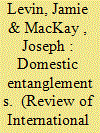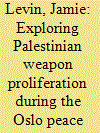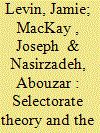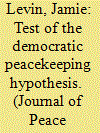|
|
|
Sort Order |
|
|
|
Items / Page
|
|
|
|
|
|
|
| Srl | Item |
| 1 |
ID:
164976


|
|
|
|
|
| Summary/Abstract |
This article revisits the Hobbesian account of the state of nature and the formation of states, attending to Hobbes’s account of the family. Drawing on feminist readings, we find in the Leviathan an account of the family as a natural political community. We contend specifically that a focus on conceptions of family life in the Leviathan, and in works by Hobbes’s early modern peers, points to the role of the family as a site of socialisation in the prelude to early state formation and in the formation of political hierarchies more generally – including, we suggest, the formation of international hierarchies. These accounts have thus far been missing from International Relations theory. Contra conventional IR theoretic readings of the Leviathan, the Hobbesian state of nature contains the seeds of both anarchy and hierarchy, as overlapping social configurations. While anarchy emerges clearly in the famous condition of ‘war of all against all’, hierarchy also exists in Hobbes’s depiction of family life as a naturally occurring proto-state setting. On the basis of this contemporary feminist analysis of a classic text, we consider implications for the emerging ‘new hierarchy studies’ in IR.
|
|
|
|
|
|
|
|
|
|
|
|
|
|
|
|
| 2 |
ID:
157525


|
|
|
|
|
| Summary/Abstract |
The Oslo peace process created a Palestinian police force for the purposes of law enforcement and preventing terrorism. However, Israel soon accused the Palestine Liberation Organization (PLO) of creating a paramilitary force as a means to spoil the peace process and achieve by force what it could not through negotiations. Others argued that PLO chair Yasir 'Arafat was engaged in coupproofing the fledgling Palestinian Authority (PA). This article proposes that the PLO's weapons proliferation was meant as an insurance policy to deter Israel from reoccupying the Palestinian Territories.
|
|
|
|
|
|
|
|
|
|
|
|
|
|
|
|
| 3 |
ID:
145704


|
|
|
|
|
| Summary/Abstract |
The use of ethnographic methods is on the rise in International Relations. However, research in this area has largely been constrained to critical or interpretive analysis of nontraditional objects of study. This has been driven in part by two practical problems that limit ethnographic analysis: that of aggregation, as international phenomena are necessarily large in scale, and that of access, as institutional settings are often closed or secretive. While we commend critical and nontraditional research for driving much-needed expansion of the disciplinary agenda, we offer a complementary account, arguing that scholars can also use ethnographic methods in explanatory research. To do so, we draw on two methodological literatures in anthropology. The first approximates ethnographic research through historical immersion. The second applies ethnographic methods at multiple research sites, tracking transnational phenomena across them. The paper sketches prospective studies of each kind, concerning the creation and implementation of the United Nations. While neither method is entirely new to IR, the methodological literatures in question have yet to receive systematic treatment in the field.
|
|
|
|
|
|
|
|
|
|
|
|
|
|
|
|
| 4 |
ID:
143792


|
|
|
|
|
| Summary/Abstract |
UN peacekeeping has undergone two major shifts since the end of the cold war. The first is a move away from limited efforts to maintain peace in post-conflict environments towards more robust efforts at peace enforcement. Second, the composition of peacekeepers has changed. In 1990, the leading contributors of personnel to UN peacekeeping missions were notable supporters of multilateral cooperation and other liberal-democratic norms with extensive peacekeeping experience. As of 2012, however, the top contributors to UN peacekeeping missions had changed dramatically: Bangladesh, Pakistan, Ethiopia and Nigeria have replaced traditional peacekeepers Canada, Finland, Austria and Norway. While liberal-democratic nations continue to bear most of the costs, they have all but disappeared on the ground, leading to a precipitous decline in the quality of peacekeeping. The consequences of the latter shift are the subject of considerable debate. Some argue that peacekeeping facilitates the transmission of democratic norms and institutions to sending states. Others increasingly argue that the so-called ‘democratic peacekeeping’ hypothesis is a ‘myth’. We go further, suggesting that autocratic states may take on peacekeeping duties as a way of maintaining costly security apparatuses for the purposes of domestic repression. Peacekeeping – a feature of liberal post-cold war global governance – risks becoming a means to facilitate illiberal domestic governance in the developing world. We demonstrate this in two tentative but cautionary cases: Fiji and Bangladesh.
|
|
|
|
|
|
|
|
|
|
|
|
|
|
|
|
| 5 |
ID:
178713


|
|
|
|
|
| Summary/Abstract |
While peacekeeping’s effects on receiving states have been studied at length, its effects on sending states have only begun to be explored. This article examines the effects of contributing peacekeepers abroad on democracy at home. Recent qualitative research has divergent findings: some find peacekeeping contributes to democratization among sending states, while others find peacekeeping entrenches illiberal or autocratic rule. To adjudicate, we build on recent quantitative work focused specifically on the incidence of coups. We ask whether sending peacekeepers abroad increases the risk of military intervention in politics at home. Drawing on selectorate theory, we expect the effect of peacekeeping on coup risk to vary by regime type. Peacekeeping brings with it new resources which can be distributed as private goods. In autocracies, often developing states where UN peacekeeping remuneration exceeds per-soldier costs, deployment produces a windfall for militaries. Emboldened by new resources, which can be distributed as private goods among the selectorate, and fearing the loss of them in the future, they may act to depose the incumbent regime. In contrast, peacekeeping will have little effect in developed democracies, which have high per-troop costs, comparatively large selectorates, and low ex-ante coup risk. Anocracies, which typically have growing selectorates, and may face distinctive international pressures to democratize, will likely experience reduced coup risk. We test these claims with data covering peacekeeping deployments, regime type, and coup risk since the end of the Cold War. Our findings confirm our theoretical expectations. These findings have implications both for how we understand the impact of participation in peacekeeping – particularly among those countries that contribute troops disproportionately in the post-Cold War era – and for the potential international determinants of domestic autocracy.
|
|
|
|
|
|
|
|
|
|
|
|
|
|
|
|
|
|
|
|
|